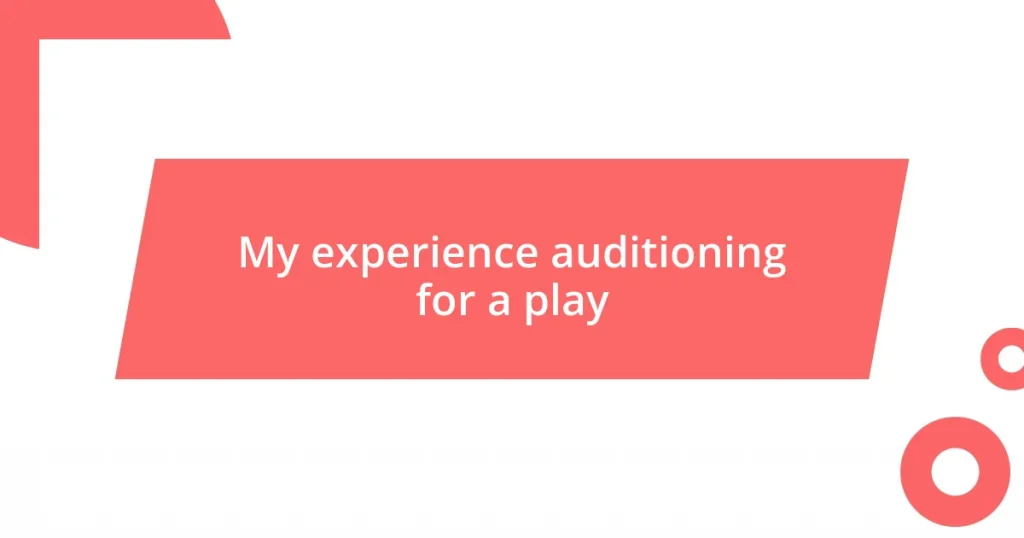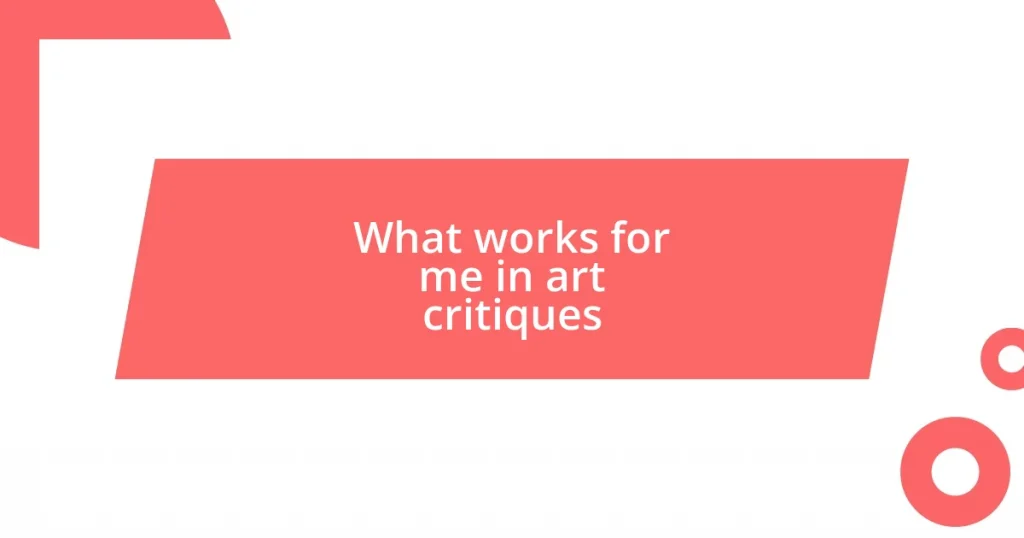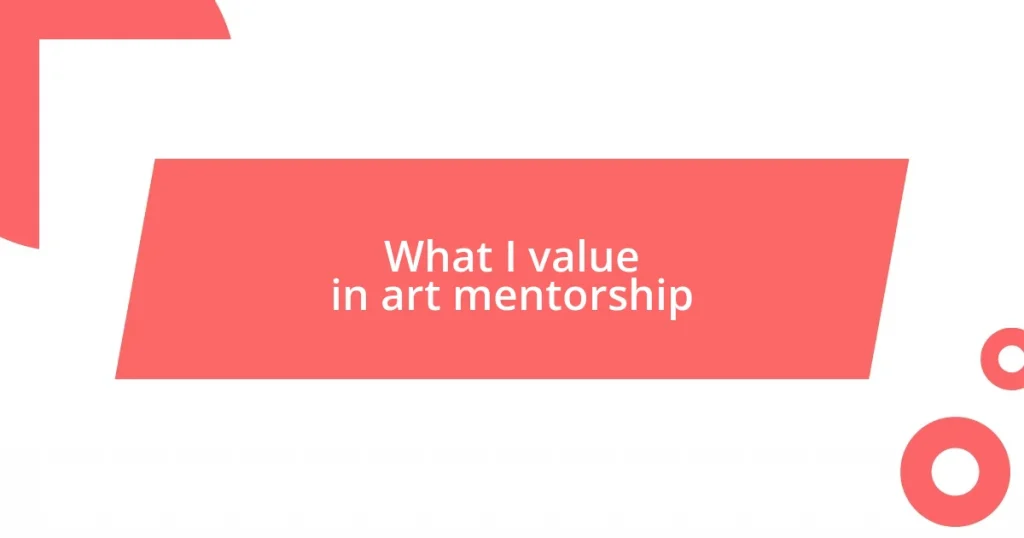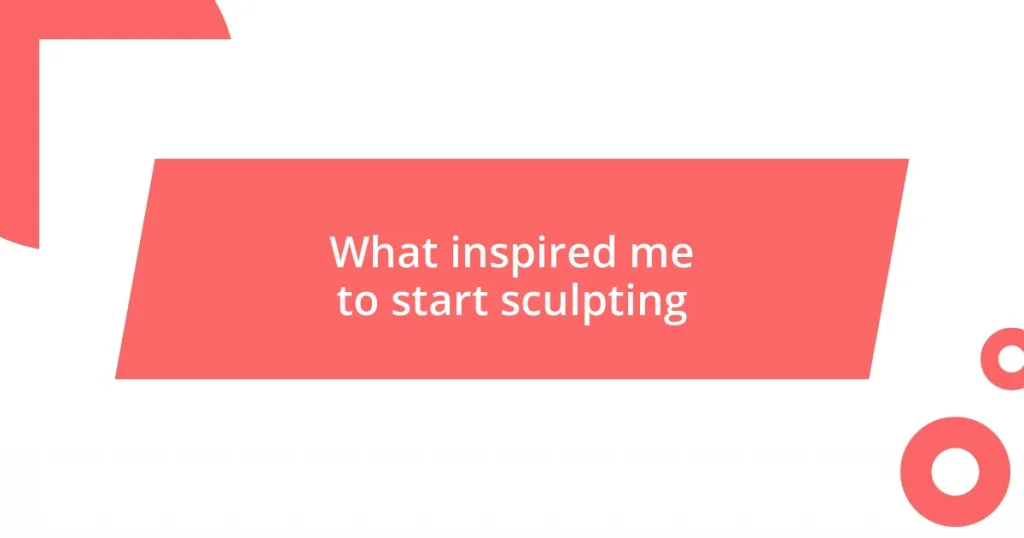Key takeaways:
- Choosing emotionally resonant material and practicing in front of friends enhances authenticity and prepares you for the audition.
- Understanding the audition process, including application submission and creating a strong first impression, is crucial for success.
- Handling nerves through techniques like visualization and grounding exercises can significantly improve performance confidence.
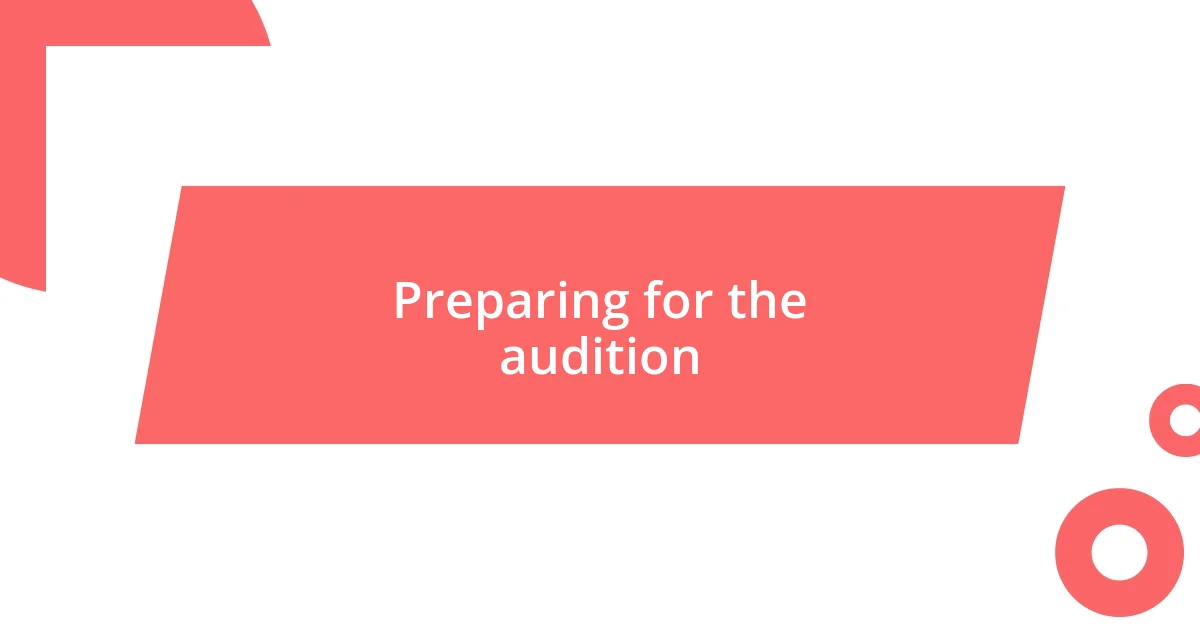
Preparing for the audition
Preparing for an audition can feel like standing on a tightrope—exciting yet terrifying. I still remember the days leading up to my first audition; I was a bundle of nerves, pacing in my room and endlessly rehearsing my lines. Have you ever felt that knot in your stomach, wondering if you’d remember every word?
As I dove into the preparation, I quickly learned the importance of choosing the right material. I sought out pieces that resonated with me emotionally, something I could connect with on a deeper level. In one audition, I was so drawn to the character’s struggles that I found myself tearing up during rehearsals—what a powerful moment that was! It made me realize that authenticity is crucial.
I also made sure to practice in front of friends. Their feedback was invaluable and helped me tweak my delivery. It was fascinating to see how different audiences impacted my performance; how do you think your close ones perceive your talent? Engaging them brought a sense of camaraderie, and each round of practice felt like a mini-Audition where I could refine my craft.
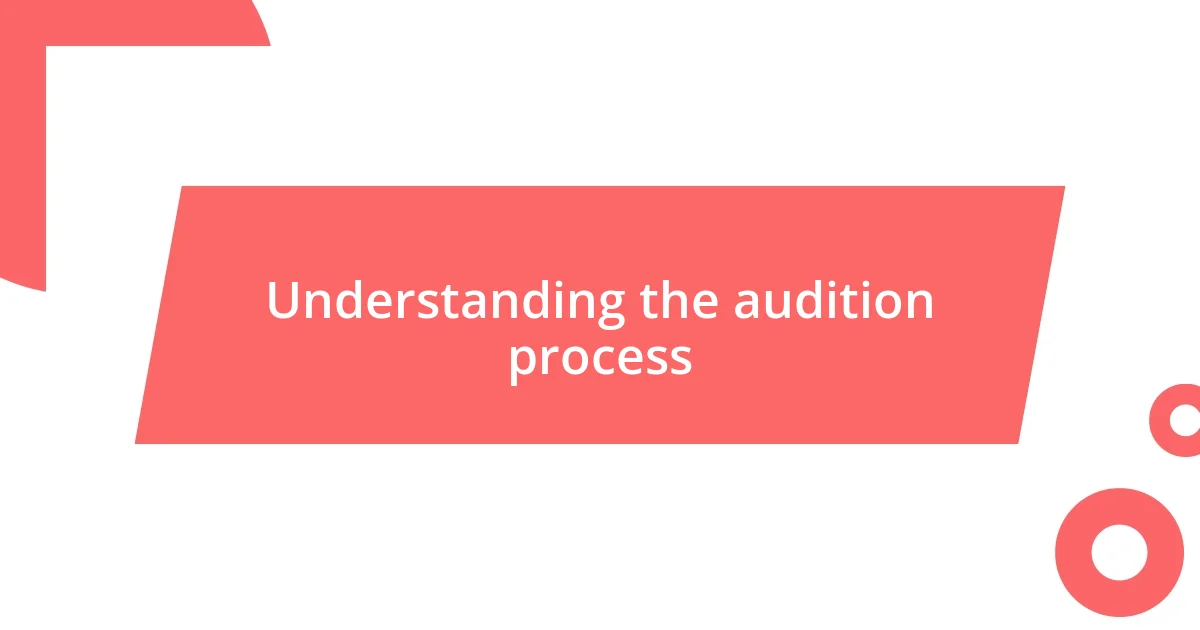
Understanding the audition process
Understanding the audition process can often be as bewildering as it is thrilling. From my experience, the first step usually involves an application, which may include submitting a headshot, resume, and sometimes a brief video showcasing your skills. I vividly recall one audition where I submitted my video late at night, nervously questioning if I had made the best impression possible. It’s crucial to follow the specific guidelines provided by the casting directors because they have a vision and you want to fit into that puzzle.
Once you secure your audition slot, the real journey begins. I remember walking into the audition room, heart racing, as I faced the panel of judges. It’s important to create a strong first impression—greeting them confidently and having your materials ready can speak volumes about your professionalism. In that moment, I tried to focus on grounding myself, reminding myself that everyone else in the room was just as human as I was. It’s all about presenting yourself authentically while also showcasing the character you’re auditioning for.
As the audition unfolds, you may find yourself performing a cold reading or prepared monologue. This is where your preparation truly shines. I found that taking a moment to connect with the material allowed my emotions to resonate through my performance. In one of my auditions, I chose a monologue that mirrored my own fears and hopes. It transformed the experience from merely reciting lines to sharing a personal story, making it easier to engage with the panel. Remember, they are looking for your unique interpretation and connection to the role!
| Step | Description |
|---|---|
| Application | Submit a headshot, resume, and potentially a video. |
| Audition Day | Arrive prepared, present yourself confidently, and make a good first impression. |
| Performance | Engage with the material and connect emotionally to showcase authenticity. |
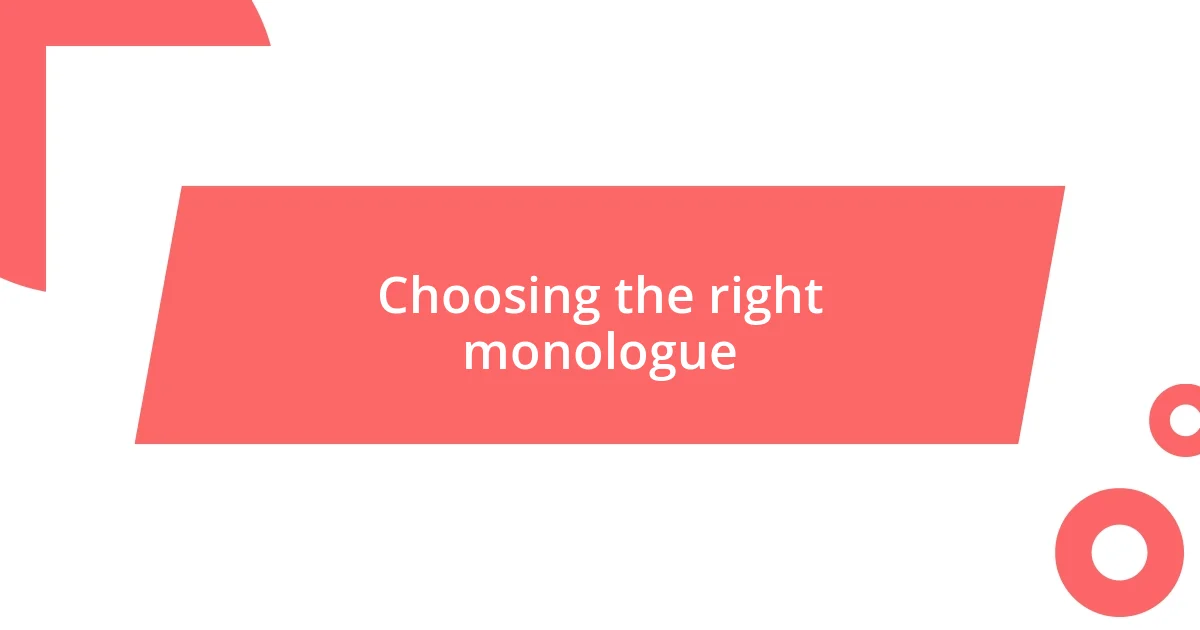
Choosing the right monologue
Choosing the right monologue for an audition is crucial—it’s your chance to shine and showcase your unique talent. I recall sifting through countless scripts, searching for that one piece that felt like it spoke to my heart. The moment I stumbled upon a dramatic monologue about a character’s internal conflict, I knew it was the right fit. I felt an instant connection; it was as if the character’s struggles mirrored my own experiences, allowing me to tap into genuine emotions during my performance.
To make the selection process easier, consider these key points:
- Personal Connection: Choose a monologue that resonates with you emotionally; it will enhance your authenticity.
- Character Fit: Understand the character you’re portraying and select a piece that aligns with your acting style and strengths.
- Length and Complexity: Opt for a monologue that fits within the time constraints of the audition and isn’t overly complicated—clarity is key!
- Diversity of Emotion: Look for material that allows you to explore a range of emotions, showcasing your versatility as an actor.
Every step, from selection to performance, should feel like a journey toward discovery, allowing your unique personality to shine through!
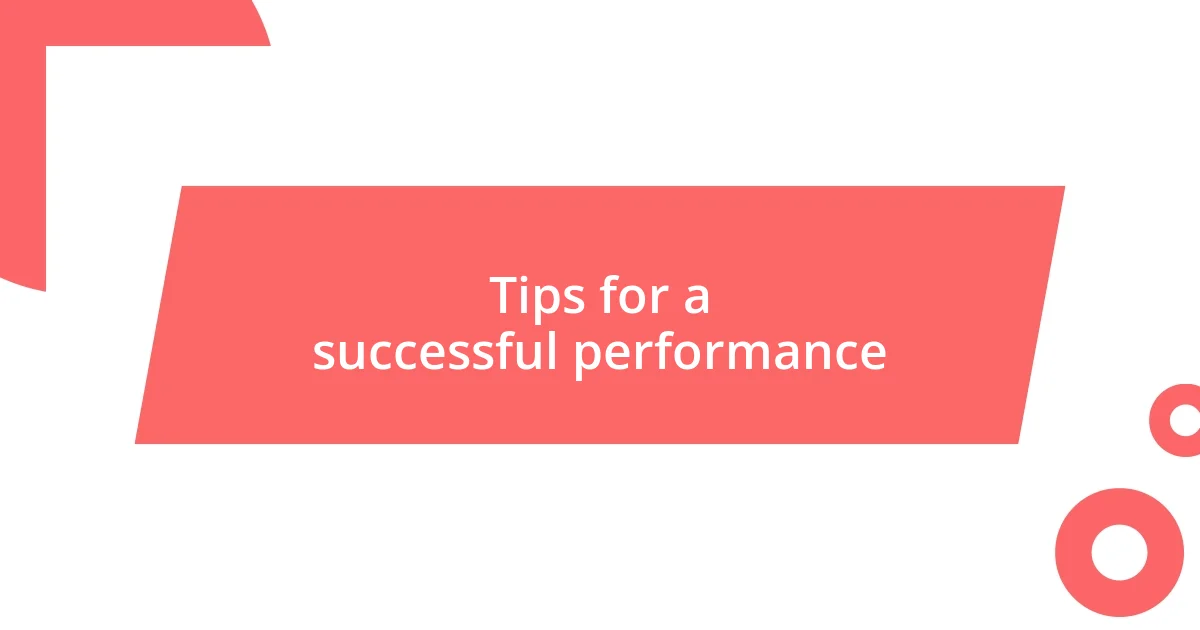
Tips for a successful performance
When it comes to delivering a successful performance, confidence truly makes all the difference. I still remember one audition where I focused on my breath before stepping on stage. It sounds simple, but taking a deep breath helped calm my nerves and grounded me in the moment. Have you ever noticed how a confident posture can transform your demeanor? It does wonders!
Preparing your character is another vital tip. I often find myself diving deep into a character’s background—understanding their motivations and relationships. For instance, before one particular audition, I created a backstory for the character I was portraying, which allowed me to inhabit their emotions. It felt like I was stepping into a new pair of shoes, enriching my performance and making it more relatable. How often do we just skim the surface instead of exploring deeper connections?
Lastly, practice truly does make perfect. I remember rehearsing in front of my friends before an audition, and their feedback was invaluable. It highlighted areas where I needed to refine my delivery. Engaging with others can shine a light on blind spots we might overlook on our own. Isn’t it reassuring to have a support system to help you gauge and enhance your preparation? Surrounding yourself with constructive critics can be a game-changer!

Handling audition nerves
Handling audition nerves can be a challenge for many, and I know this from my own experiences. During one audition, I felt my heart racing and my palms sweating as I stood in the waiting room. I’ve learned that acknowledging my nerves is the first step; instead of suppressing them, I remind myself that it’s completely normal to feel this way. Have you ever considered how your nerves might just be a sign that you care?
Another technique that has helped me immensely is visualization. In one particularly nerve-wracking audition, I closed my eyes and imagined myself successfully performing on stage—feeling the spotlight warm on my face, hearing the applause, and relishing in the connection with the audience. This mental practice shifted my focus from fear to excitement. Do you think visualizing success could help ease your nerves as well?
Finally, preparing a few grounding exercises can really make a difference. Before I step on stage, I often take a moment to stretch or ground myself by feeling my feet on the floor. In a recent audition, this simple act made me feel more connected to my body and the present moment, dissipating some of that anxious energy. Isn’t it amazing how small actions can create a ripple effect on our confidence?
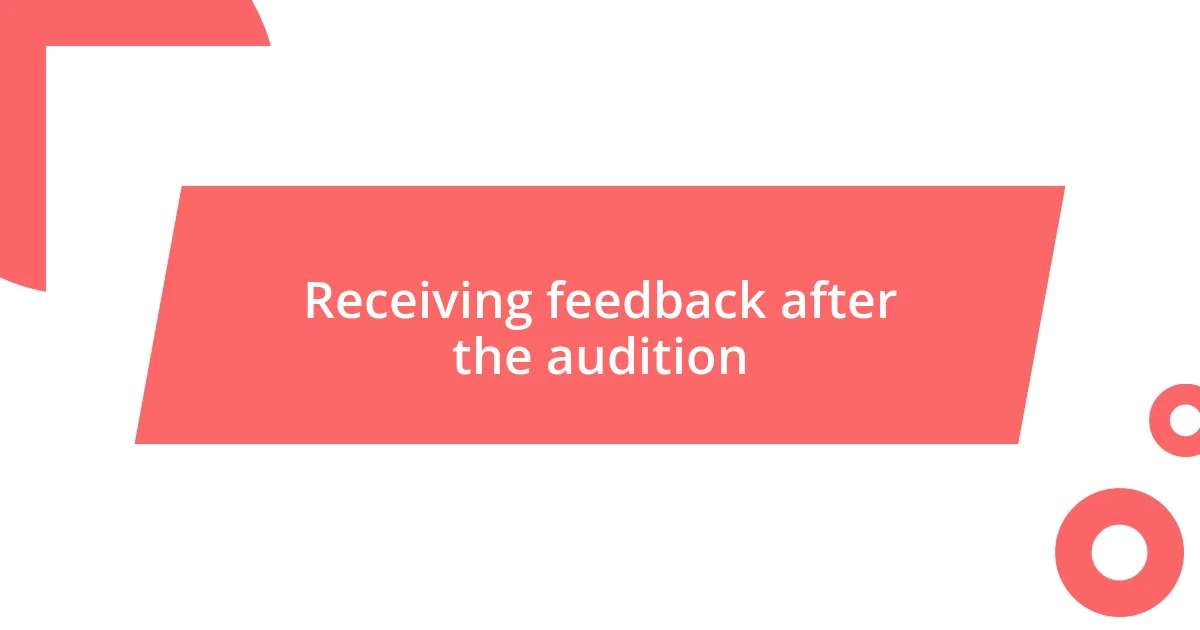
Receiving feedback after the audition
Receiving feedback after an audition can be a mixed bag of emotions. I recall one audition where I was anxiously waiting to hear my results. When the director finally shared their thoughts, I felt a rush of vulnerability. Their feedback was honestly constructive, pointing out my strengths and suggesting areas for improvement. How often have you left an audition room, eager yet anxious about what the evaluators might say?
Sometimes, the feedback can sting a little, especially if I felt I had performed well. I remember a particularly tough critique that focused on my pacing; it felt disheartening at first. Yet, in hindsight, I realized that it was an invaluable learning opportunity. Challenging feedback pushed me to refine my skills and grow as a performer. Have you ever had a similar experience where what seemed harsh turned out to be precisely what you needed?
Celebrating the positive remarks is equally important. After receiving heartfelt compliments, I find it’s crucial to savor those moments. I once heard a casting director mention how my character’s depth resonated with them. I took the time to absorb that praise, which not only bolstered my confidence but also validated the effort I had put into preparing. Isn’t it incredible how a few kind words can ignite our passion and inspire us to push forward?
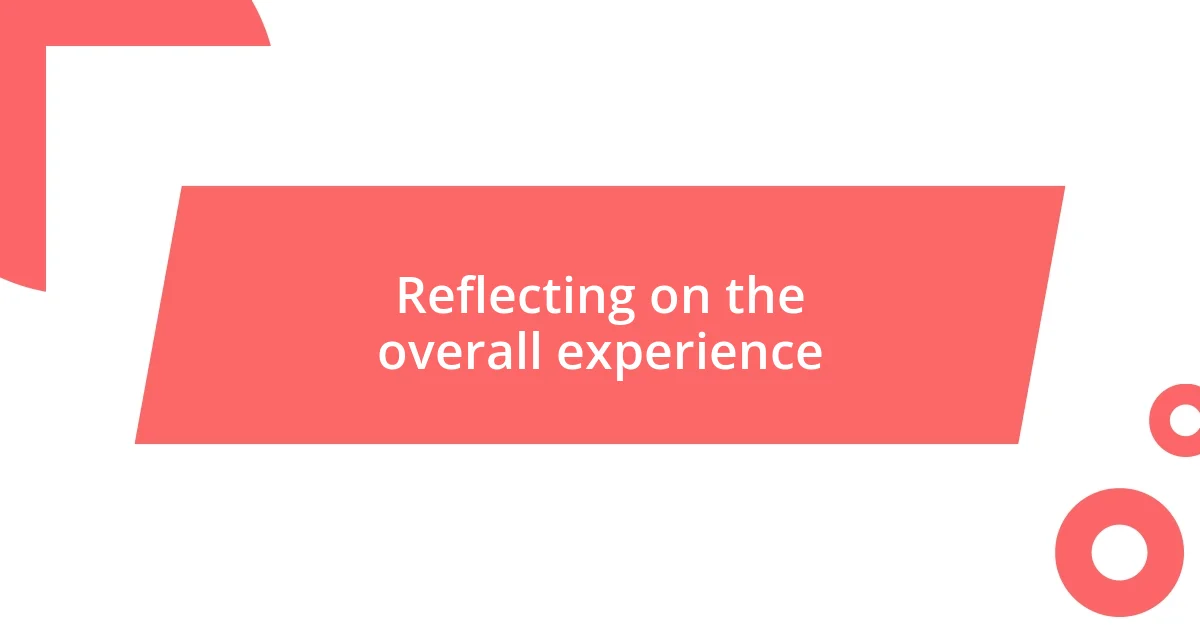
Reflecting on the overall experience
Reflecting on the overall experience of auditioning brings a whirlwind of emotions. I remember walking out of one audition feeling energized yet exhausted, as if I had bared my soul for all to see. It’s funny how we often think of auditions as just a gateway to a role, but I’ve come to realize they’re really about self-discovery. Have you ever thought about how much you learn about yourself in these moments of vulnerability?
There are days when I leave an audition with a sense of clarity, knowing I gave it my all, regardless of the outcome. I recall one audition where I stumbled over lines but managed to connect with the material emotionally. That connection mattered more to me than any casting decision. It’s fascinating how sometimes, despite not landing a role, I walk away with a reinforced belief in my talent. Don’t you think that even failed auditions can empower us when we focus on our personal growth?
Ultimately, each audition serves as a chapter in the ongoing story of my performance journey. I find that reflecting on these experiences often leads to a deeper understanding of what I want and who I am as an artist. I once detailed my audition experiences in a journal; months later, rereading those entries helped me appreciate the evolution of my craft. Have you taken the time to reflect on your own journey and what it teaches you?










